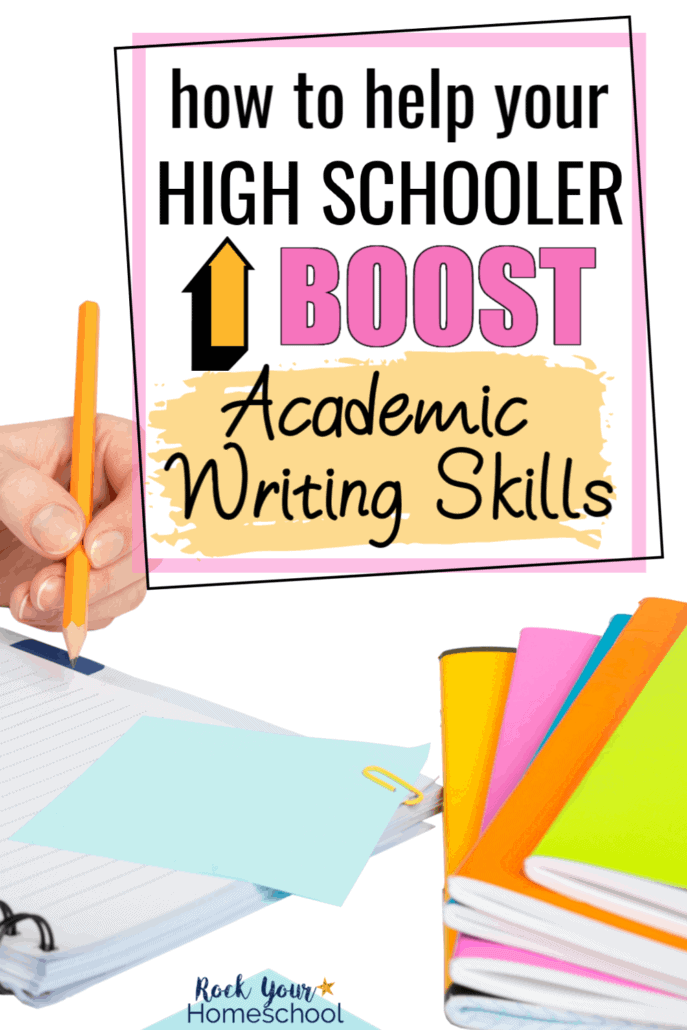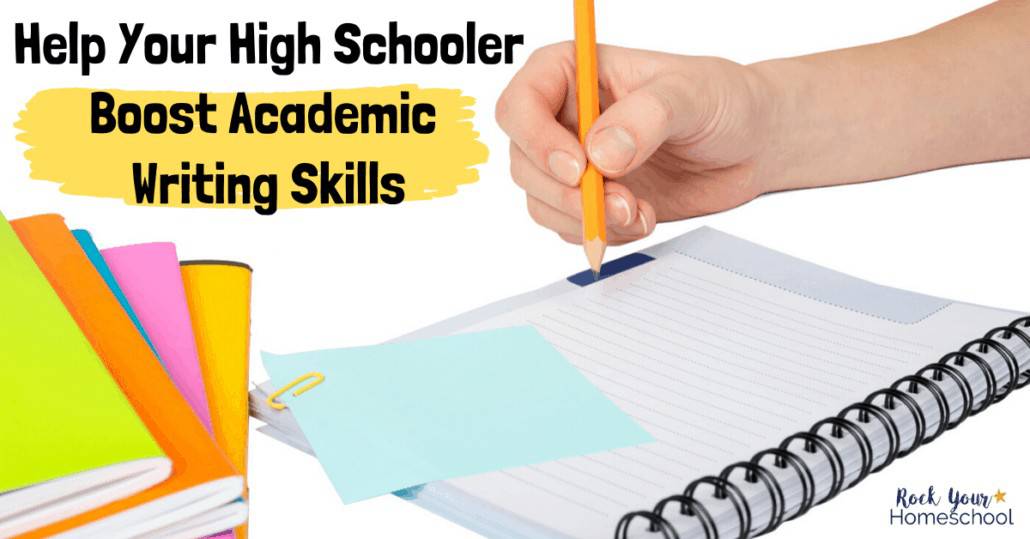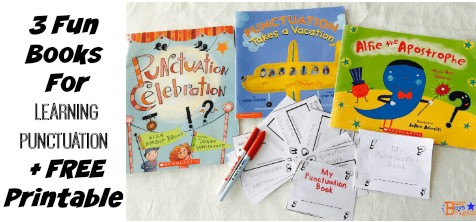If you’ve got a high schooler (or soon-to-be), you’ll be so glad to have these tips for boosting academic writing skills. Ray Case shares his expertise and amazing resource to help you navigate this challenging subject.

Why Academic Writing Skills Are Vital
As a homeschool dad and a college professor, I have witnessed firsthand the struggles students face when they begin to encounter the high expectations of higher education. It can be a difficult shift for some.
By the time students transition into the world of university studies, I have found that many have not acquired the skills they need in order to be successful.
Most struggle through and learn the needed skills as they walk through the fire. Unfortunately, some do not and their struggles often lead to an acquired distaste for learning, or even the abandonment of their studies. That, for me, is very upsetting.
Not everyone needs to go to college, but some students who have what it takes to be successful are simply failing because they cannot write at the necessary level.
Why Are Academic Writing Skills Such A Problem?
One problem that I’ve identified is the resources available for teachers.
Some resources are very good, but quite a few that simply do not resonate with students. They’re dry, clinical, and boring. Many of the books used to teach academic writing are written by PhD’s who seem to be writing for their peers rather than students. These giant tomes full of complex rules can be very intimidating – even for professors outside of the English department.
Another area that has contributed to struggles in this area is what I like to call the Culture of Brevity and Exclusivity.
We text but do not use actual words.
Everything is abbreviated. If you do not understand the abbreviations then you are outside of the culture and, therefore, excluded.
This exclusion has become acceptable because it’s a sacrifice on the altar of technical advancement.
Depth of meaning is another sacrifice to the gods of wi-fi, mobile data and ceaseless connectivity. Some can flip the switch and add depth to their writing when needed, but many cannot. I see it all too often.
This problem of Cultural Brevity and Exclusivity isn’t totally new. People of my generation suffer from it as well, though perhaps to a lesser degree.
I point this out because, as teachers in a homeschool environment, it’s difficult to root out a problem within our children’s habits if we are an unwitting fellow sufferer.
How could we not know? Well, this issue can be hidden somewhat within the domestic and professional world. If you’re writing a letter or an email at work, for example, there isn’t much pressure to include great depth.
You already have the job, so there’s a degree of latitude when it comes to minor errors or vague statements because you’re “on the team”. Your peers are familiar with your subject matter and can read between the lines.
Your customers just want their information. If they get what they want, they’re usually happy to ignore an error in the text.
Teachers and professors, however, usually have no interest in reading between the lines. They want clear, concise expressions of understanding. They are not our peers and will not fill in the blanks that are left within our work. This can be a very shocking and stressful realization for our students.
Hope & Encouragement for Academic Writing Skills
Okay, now that I’ve painted a somewhat intimidating picture, let me infuse a degree of hope and encouragement.
Most professors have no interest in destroying a student’s paper. Since most professors have enormous workloads, if they do not have to invest their time addressing avoidable mistakes, they’ll be extremely happy.
Notice I said “avoidable mistakes”. Those are the things that drive professors crazy, and those are the things I want to address for you now.
In my book, Academic Writing Survival Guide, I describe these mistakes and ways to avoid them.
I will share four of those avoidable mistakes with you here:
Number 1: An academic paper is not meant to be a giant lump of rambling text. Most of us know that there are typically three parts of a paper. There is a beginning, a middle, and an end.
Unfortunately, this common understanding is not always reflected in my students’ submissions. I often get an insufficient introduction, followed by a large middle-ish part, and an ending that reads more like the conclusion to a business letter than it does a conclusion to an academic paper.
When writing, make sure the three standard parts of the paper exist as distinct elements (each accomplishing their designated purpose), but also be sure they flow together so that the paper does not feel choppy and disjointed.
Number 2: Know your assignment criteria. What is the teacher asking for? As silly as it sounds, this is a huge problem.
I have often requested one style of paper, only to receive something completely different. If the assignment calls for a persuasive essay, then that is what needs to be submitted.
Many students, however, are unfamiliar with the different types of academic writing they will encounter. It is critical that our students learn to invest some time on the front end of each assignment to become clear on the criteria for their assignment.
- What kind of writing will it require (persuasive, analytical, descriptive, or critical)?
- What are the characteristics of these styles?
- Will there be overlap (more than one kind used simultaneously)?
If these questions are not answered before the project begins there is a strong likelihood that the student will either have to go back to the drawing board at some point or will simply score very low on the assignment. Neither scenario is very appealing.
Number 3: Know the culture you’re writing for. College is a pretty diverse environment.
In order to be awarded a degree, a student will have to take classes that they are not necessarily passionate about. Their professors, however, are likely very passionate about the subject matter and will expect full engagement.
For an Art major in a Political Science class (I witnessed this example firsthand), this might be difficult. The inherent difficulty, however, does not make it any less important.
The person the student is writing for has certain interests that excite and inspire them. It is important to realize that, as a writer (in our education system “student” and “writer” are terms that cannot be easily separated) in an academic setting, a student must be willing to adapt their writing to the needs of the reader.
The reader is the target, the content is the arrow. The content is being delivered, but it is being presented to a reader, and their needs have to be (as far as the student is able) identified.
Number 4: Don’t break the rules.
In my book, I devoted an entire chapter to this issue. It’s very frustrating for teachers at all levels to encounter these problems, but for professors, these issues can make them want to toss the paper straight into the recycle bin. Please read these carefully:
- Don’t plagiarize – even accidentally. If someone else wrote it or inspired the idea, give that person the credit. To do otherwise is intellectual theft, and nothing will anger a professor quite like the stealing of intellectual property. Remember, most professors are published, so the idea that a student would steal someone else’s work means that they might also steal theirs. It becomes a very personal issue. Know your sources, and give credit where credit is due.
- Emotions are valid, but not if they masquerade as fact or seek to be the basis of a persuasive argument. At that point, you have moved toward demagogy, and that is not how you want your paper to be interpreted. If a sentence contains “I think”, “I feel”, or “I believe”, you are on shaky ground. Those are sentences that could safely reside in any letter to your local newspaper, but should be avoided whenever possible in an academic paper. These kinds of statements are too easy to attack and quite difficult to defend. They open the door to hostile critique. I’m not saying they cannot ever be employed. They can, but they carry with them many potential problems. If you choose to use them be sure to buttress them before and after with statements that render them natural progressions from established truths.
- Don’t go off on tangents. Sometimes, it is necessary to leave the main focus of the paper to bring in some seemingly unrelated information that does, in fact, support the writer’s arguments. If such an exit from the flow is needed, make sure the reader knows why, and return to the main focus as quickly as possible.
- Don’t use slang or colloquialisms. Even before reaching college students need to get in the habit of writing for a broader world. English is spoken widely across the world, but the English that is spoken outside of your area is not as consistent across all speakers as you might think. A college student should be able to convey their ideas across linguist and cultural lines. Learn to be concise. Learn to utilize the most universally accepted means of expression. Write for the broadest possible audience and you’ll be sure to leave no one scratching their heads as they attempt to interpret what may appear to be odd or awkward phrases.
- Don’t go it alone. It is never a good idea to submit a paper without first presenting it to a trusted proofreader. Even in a homeschool environment, when possible, the person who will evaluate the paper should not be the first one to read it. If an older sibling can act as a sounding board, this can have an added benefit, as it can be good analytical practice for them. It may not be possible in every instance, but, in so far as you are able, you should help your child develop the habit of utilizing proofreaders. When your student reaches the college level their trusted proofreaders will be worth their weight in gold. It is important to accept the reality that a person can almost never see all of their own mistakes. Encourage your student to embrace the humility of a willing vulnerability. Teach them to share their work before it is exposed to final evaluation.
You Can Help with High School Writing
Academic writing skills do not have to be intimidating. It is, however, meant to be challenging.
Teachers may not be looking to expose a paper’s flaws, but it is necessary if the work does not meet the standards of the academy. There will always be tension between effort and expectations, and that’s okay.
We want our children to work for their results, so teaching a willingness to exert effort should reduce that tension somewhat.
What we, as parents, don’t want is there to be a lack of general process understanding that renders our children’s efforts wasted. We need to present the process in a way that will speak to them.
The process will not be easy. It’s not supposed to be.
The good news is it does not require special giftedness. It simply requires a message (something to communicate), a little discipline and attention to detail.
I firmly believe that any student can be taught to produce work that can meet the expectations of the academy. Even if the student never goes to college (not all children need to), they will still have customers, employers, employees, lending institutions, etc. with whom they will need to correspond.
Competency in academic writing skills will serve our students well beyond their years in the classroom.















